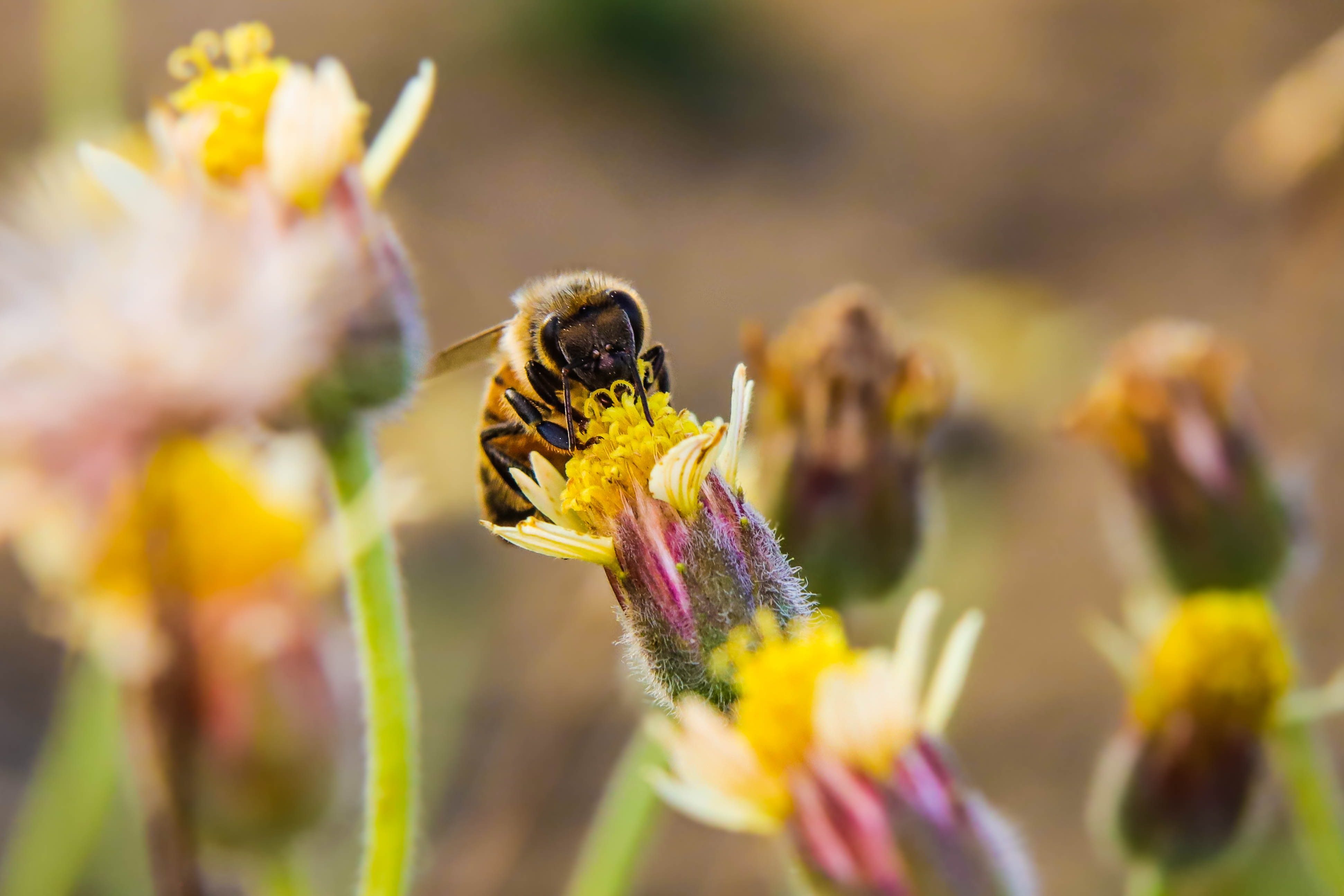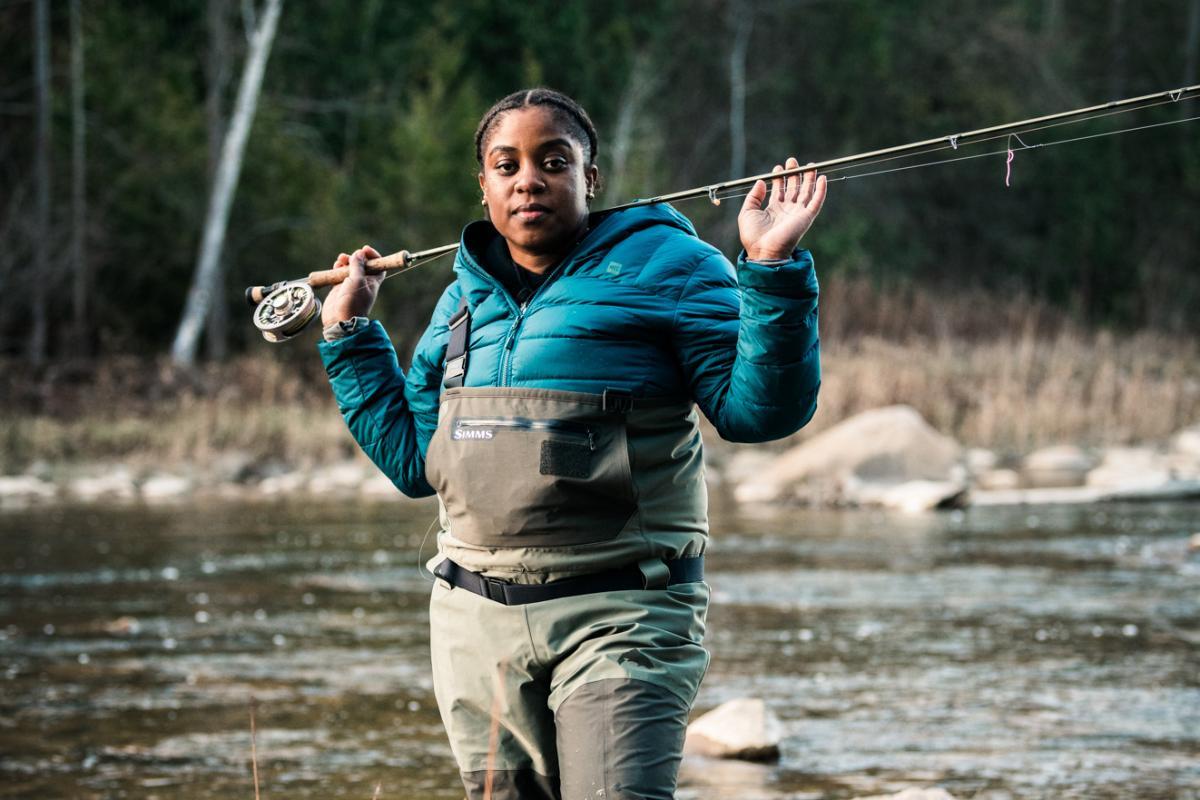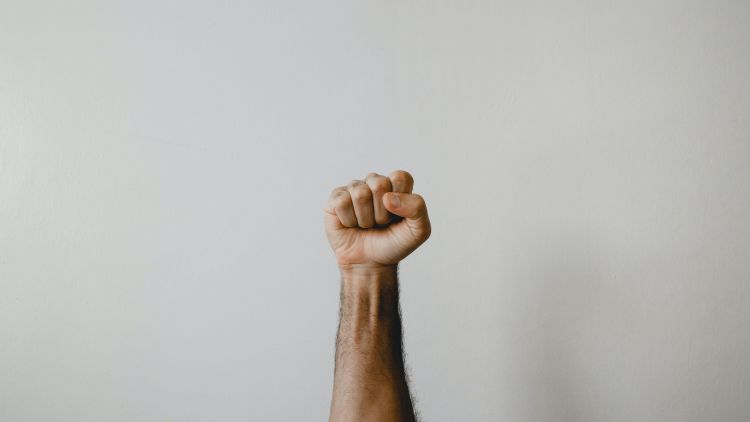It’s Black History Month! We reflected on how we wanted to celebrate, and ultimately just turned to only a handful of the really amazing Black environmentalists we follow. These scientists, scholars and community activists have broadened our perspectives and we’ve found their work to be incredibly valuable both in and out of the classroom. Their work inspires us to be better educators, and we hope they’ll inspire you to do the same. So without further ado, here are a few of the folks who brighten up our feeds every day!

Peter Soroye (he/him)
Twitter | LinkedIn | Website
Peter Soroye is a PhD graduate from University of Ottawa, where he studied “the effects of climate change and habitat loss on pollinators across continents.” We know that pollinators are essential to global food security, so it’s no wonder that this invaluable research was published in Science even before Dr. Soroye completed the project. The journal even highlighted his work, specifically! His current research interests include climate change and land use impacts, and community science for research. You can scroll through his publications here. Dr. Soroye is currently the Assessment and Outreach Coordinator at Wildlife Conservation Society Canada, an organisation dedicated to the conservation of Canadian wildlife through science, conservation action, and inspiration. Both Dr. Soroye and the WCSC view science communication as just as important as the research itself—and good thing, too! Without good science communications, academia would stay within the academy.
We love the work that Dr. Soroye does. Besides being interesting and incredibly important, teaching learners about pollinators and how they’ve been affected by climate change is a great way to get them involved with projects aimed at helping save local pollinator populations.
Larissa Crawford (she/her)
Twitter | Instagram | LinkedIn
Larissa Crawford is an incredibly accomplished activist and artist. A published Indigenous and anti-racist scholar, she’s also an award-winning ribbon skirt artist and the founder and manager of Future Ancestors, an Indigenous and Black-owned, youth-led professional services social enterprise, whose mission is to “support clients and community in honouring our responsibilities as future ancestors to shape the just and sustainable futures our next generations will inherit.” Her Metis and Jamaican ancestry informs all of her work—this ancestry is also passed down to her daughter, Zyra.
In addition to graduating Summa Cum Laude with a Bachelor of Arts and with double major in honours International Development and Communication Studies at York University, Larissa has been named: a 2019-20 Action Canada Fellow, Government of Canada 2020 10 Influencers to Watch, FLARE Magazine Top 50 Women, 2019 GLOBE Very Impactful Person, and one of Corporate Knights’ 2019 Top 30 Under 30 in Sustainability. She’s worked alongside the Government of Ontario as an Indigenous Policy Advisor with the Ministry of Energy, Northern Development, and Mines, and as an Advisor at the Ontario Anti-Racism Directorate, Ministry of the Solicitor General.
She started a library in Accra, Ghana and has volunteered in Istanbul, Turkey. During her time at York, she represented the school at several global United Nations events, and has since volunteered as the 2018 G7 Youth Head Delegate of Canada, where she lobbied successfully for Indigenous climate action in the G7 Summit (this work is on-going). She also volunteers as the Project Lead with York University’s race-based data collection initiative, the advisor on the Toronto Police Services Anti-Racism Advisory Panel, and Community Council member at Aboriginal Legal Services. Believe it or not, this list isn’t comprehensive—for more on Larissa’s accomplishments, click here!
We’re inspired by Larissa for a variety of reasons. As folks who create teaching materials, the kind of intentionality and consideration with which she carries out her work is something we strive for. Larissa’s work has also taught us that incorporating ancestry (of learners, of educators, of the land) into discussions about sustainability and climate change is essential to approaching the climate crisis from a place that is understanding and just.
Chúk Odenigbo (he/him)
Twitter | Instagram | LinkedIn | Website
Chúk Odenigbo is a multi-talented artist, scholar and activist, whose accomplishments include: lead author of Les Forces de la Nature: L'Enfant de Gaïa/The Forces of Nature: Gaia's Child, a children’ book that encourages young people to view their relationship with nature as a superpower, and the direct of the UN-recognized Green Dream photo series. In 2018, he organized a sold-out sustainable, ethical fashion show at the Vancouver Aquarium. Aside from his activism, he’s also spoken at several international and local conferences (WE Day, the Healthy Parks Healthy People Forum, the Nature Champions Summit, the Atlantic Outdoors Forum, etc.), and has led important discussions on climate change and youth engagement with Global Affairs Canada, Youth Climate Lab, the Salzburg Global Seminar and other government and non-government agencies. He’s taught and designed courses for the University of Ottawa and ECO Canada.
Chúk is mostly known as the founding director at Future Ancestors and the co-founder of The Poison and the Apple, an Albertan-born, bilingual non-profit that seeks to make nature a truly diverse and accessible space by changing the way Canadians interact with nature. This intersection between culture, health and the environment tend to be a throughline of his work. Currently, Chúk is a PhD Candidate at the University of Ottawa, where he studies the relationships between human health, the environment, geographic factors, society, and healthcare to shed light on public health policies and strategies. He’s also part of the Healthy Parks, Healthy People (HPHP) movement, which centres around the intersections of humanity, nature, health and healthcare to influence public health policy. You can hear him talk about his work on Reseed podcast here.
In addition to all his other accomplishments, Chúk is one of Corporate Knight’s Top 30 Under 30 Sustainability Leaders, the Alberta Council for Global Cooperation’s Top 30 Change-Making Albertans Under 30, Radio-Canada’s Top 10 young Franco-Albertan Leaders, and has been named as one of The Starfish’s Top 25 environmentalists under 25 in Canada three years in a row. Chúk was also MEC's ambassador for the outdoors and is an alumni of the first Ocean Bridge cohort, a group of young Canadians leading ocean health and literacy projects across Canada.
It can be easy to forget that the environment is so tied to health, but Chúk’s research reminds us that policy, geography, environment and health are inextricably interlinked. Where city parks are located and how well-maintained they are has a direct impact on residents. Starting to introduce students to the concept of health-environment early—and beyond simply talking about air quality (though that is also very important!)—can be a great way to engage students and root complex concepts in their personal experience.
Alicia M. Richins (she/her)
Twitter | Instagram | LinkedIn | Website
Alicia M. Richins has a Master in Environmental Science from York University, and has been published in Routledge's Local Activism for Global Climate Justice. During her degree, she worked at the Inter-American Development Bank on the portfolio management of the Caribbean Country Department. A dual citizen of Canada and Trinidad & Tobago, she has an interest in international cooperation and development that really informs her work. It’s no surprise, then, that she founded an environmental consultancy after she graduated, where she uses the UN Sustainable Development Goals (SDGs) as a guiding framework to help social enterprises and non-profits optimise their social and environmental impact strategies. She consults, is a speaker, does workshops, and works in an advisory capacity—oh, and did we mention she’s a trained concert violinist? Alicia describes herself as a “ecological-economist-systems-thinker-researcher-analyst-project manager-facilitator-performer-storyteller turned social impact consultant” and the name, while long, is definitely apt. She does it all!
Like Alicia, we also want a socially, ecologically and economically resilient future for all. We think most people probably do! And using the UN’s SDGs to foreground materials for learners is a really great way to manage climate anxiety. Having goals to work towards is much easier to manage, for learners and educators, both!
Jacqueline L. Scott (she/her)
Twitter | Instagram | LinkedIn | Website
A PhD candidate at University of Toronto in social justice education, Jacqueline L. Scott studies the perception of wilderness in the Black imagination—in other words: how to make outdoor spaces more accessible to Black folks! She’s continuing her research as a 2022 Safina Centre Fellow, and has done work with the Nature Conservancy of Canada. She’s published three books (50 Places: A Black History Travel Guide of London, Heartbeats in Africa: A Memoir of Travel and Love, Sailing on a Half-moon) and is currently working on her fourth. She’s also been published in The Conversation and CBC among others, and has been interviewed in countless publications, including: The Narwhal, La Presse, The Globe and Mail, The National Post.
However, despite her huge body of work, you probably know her best for her blog: Black Outdoors. The blog is an amalgamation of her research and outdoor adventures; every entry feels like sitting down with a cup of tea and chatting with an old friend—she has a way with words that makes reading about the climate crisis calming. We like to scroll through on our breaks!
Cheyenne Sundance (she/her)
Instagram | LinkedIn | Website
Cheyenne Sundance is a self-taught urban farmer who started Sundance Harvest Farm due to a lack of equitable farming in Ontario. The operation is an urban farm in Toronto that is food justice-centered, aiming to provide “resources, knowledge and guidance for youth who are marginalized within the food system to start their own food and land sovereignty movements, create their own urban farming practice and to eradicate institutionalized racism within the food system.” From Growing in the Margins, a free urban agriculture mentorship program; to Spring Farm School workshops that teach the A to Zs of farming and food growing; to consultations, education and mentorship is at the heart of Sundance Harvest Farm. Cheyenne’s most recent initiative is Lawn Learners, a yard-sharing project connecting prospective food growers and landholders. Cheyenne also started the first BIPOC Farmers Caucus across Canada with the National Farmers Union (where she sits on the Executive Board), and is on the Ontario board of the National Farmers Union.
Cheyenne reminds us that food security and food justice are inextricably linked—and that easy access to food is essential to a just, climate changed world. Grassroots operations like Cheyenne’s are great resources to help break down concepts like food deserts, false scarcity and how food, climate and capitalism are interlinked for learners.
If you’re in Toronto or its surroundings, Sundance Harvest Farm offers short workshops that could foreground more complex food-centred ideas, as well as seasonal CSA boxes.

Demiesha Dennis (she/her)
Twitter | Instagram | Facebook | Website
Demiesha Dennis is the founder of Brown Girl Outdoor World (BGOW), an Ontario-based organisation whose mission is to change “the narratives assigned to the Black, Indigenous and People of Colour (BIPoC) community and our place in outdoor adventure and recreation.” Demiesha was born and raised in Jamaica before moving to Canada at eighteen, where she fell in love with outdoor adventuring. It was then that she realised outdoor recreation spaces in Canada were not made for her. So, she decided to change that. BGOW is remarkable in that it’s action-based; Demiesha actively works to change the narrative by providing space for BIPOC adventurers through organised events and adventures.
“Brown” girl was chosen specifically because wants her org to encompass a wide range of people; not just Black folks, but folks who are Asian, Black, Indigenous, Latina, etc. Even white folks, she says, are welcome into the space as allies, to help uplift the work BGOW is doing. BGOW is also a specifically welcoming and safe space for women, who are often overlooked in outdoor recreation.
We really appreciate Demiesha’s work. BGOW changes the way folks relate to the outdoors, and in doing so, puts the history of outdoor recreation into stark relief. Whiteness has pervaded this industry since it began as a commercial venture, and in doing so, has directly and indirectly excluded and erased everyone who doesn’t fit the mould. This is a big problem in mountaineering, where Indigenous Peoples’ achievements are often overlooked in favour of white accomplishments, and/or their requests to white climbers go ignored.
For many of us, our love for the environment and our desire to be good stewards of this planet stem from our recreational experiences outside. We think that using Demiesha’s work to foreground the structural racism of the outdoor industry is a really great way to start the conversation!
Topics: Black History Month, Black in STEM, Environmentalism, Community Activists
Back to Blog

